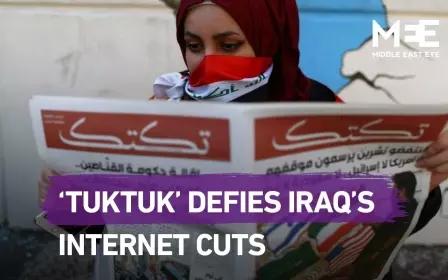Iraqi journalists face wrath of authorities over protest coverage

As protests in Iraq approach the two-month mark, a lot is at stake. Security forces are reported to have killed more than 400 protesters and injured at least another 15,000 since 1 October.
Meanwhile, journalists who seek to expose corruption or excessive use of force by Iraqi authorities no longer only face the dangers of armed militias, thieves or bandits.
With growing frequency, they now risk threats and violence from various local and federal security forces - the very entities designated to uphold the peace and protect law-abiding citizens.
Iraqi Prime Minister Adel Abdul Mahdi and his allies have recently accused media outlets of stoking the protests and inciting against the government - and local security forces have also expressed hostility towards journalists and their profession.
According to a recent report by Reporters Without Borders, Iraq ranks amongst the bottom 13 percent of countries when it comes to press freedoms and safety. Back in 2013, Iraq used to be at the 150th spot on the list. Now, it ranks in the 156th spot - and the recent closure of several news outlet headquarters gives little hope for immediate improvement.
Stay informed with MEE's newsletters
Sign up to get the latest alerts, insights and analysis, starting with Turkey Unpacked
Offices shut down
On 21 October, Iraq’s Communication and Media Commission (CMC) issued a statement effectively shutting down several local and regional television channels - among them were Dijla, Al-Hadath, Arab News Broadcasting (ANB), NRT, Al-Rasheed, Alhurra Iraq, Al-Sharqiya, Al-Fallujah, Al-Arabia Al-Hadath and Huna Baghdad.
Other television channels al-Sumaria, Asia, Rudaw, Sky News Arabia and Ur received warnings.
A number of radio stations were also shut down “for violating the regulations of media licensing rule”. In early October, an armed group attacked NRT Arabia’s Baghdad office, sowing destruction in an attempt to tamp down coverage of ongoing protests.
Observers also told MEE that restrictions on the media were one of several tactics - including cutting off internet access - carried out by Iraqi authorities to curb the protests and stop information from coming out.
For Ibrahim al-Sarraj, the president of the Iraqi Association for Defending the Rights of Journalists (IJRDA), the CMC’s decision to shutter the offices of so many news outlets is a dangerous step.
“The CMC was hasty, and it is a pity that the government resorted to such a decision because there are no clear regulations governing media work in Iraq,” Sarraj told Middle East Eye.
“There is no cooperation from the Iraqi government. Even the culture and information committee in the Iraqi Council of Representatives fails to cooperate,” Sarraj added. “No government agency has listened to our requests to stop the violence.”
Threats and beatings
The decision to shut down the news channels’ offices comes after weeks of journalists being attacked while covering the demonstrations that have rocked Iraq for nearly two months.
Hussein al-Khazali, a Dijla TV correspondent in the Muthanna province, told MEE he and two colleagues, Mustafa al-Rikabi and Murtadha al-Younisi, were attacked earlier this month.
“While we were covering students protests in the city, security forces moved toward us,” Khazali said. “I fled, but my two colleagues were assaulted.”
Rikabi had to get six stitches on his head following the attack, and sustained bruises over his body.
“We told security forces that we were authorised journalists and just telling people what we see, but they did not allow us to keep exercising our profession,” Khazali said.
But protests aren’t the only thing Iraqi authorities and political forces have been keen to attack journalists for covering.
A journalist from the Babil governorate in central Iraq, who requested anonymity for his own safety, told MEE he had recently been interrogated in his home by someone who identified themselves as a military official for the Kataib Hezbollah - an Iran-backed Iraqi paramilitary group.
“The doorbell rang, I opened the door and saw a bearded person accompanied with five people wearing normal clothes. I invited them into my house, but their language was very tough,” the journalist said.
'I consider these suspicious threats to be repression of freedom of speech and a clear threat to journalists'
- Iraqi journalist from Babil
“I felt as if I was under investigation,” he added. Upon asking why he was being interrogated, the journalist was informed that the reason was a report he had done on thousands of Sunni residents being prevented from returning to their town after it was retaken from the Islamic State (IS) group.
“As a journalist, I consider these suspicious threats to be repression of freedom of speech and a clear threat to journalists to stop them from doing their profession,” the Babil journalist said. “Because of militias, the feeling is that journalism has become too dangerous a job to continue working anymore.”
The dangers in carrying out their jobs have reportedly pushed dozens of journalists since 2014 to end up on so-called “death boats”, paying human smugglers exorbitant amounts to flee the country on poorly maintained dinghies.
Sarraj said IJRDA had documented more than 50 cases of journalists being attacked, threatened or killed since the mass protest movement began. “The number is higher,” he said, “but we haven’t been able to document every incident given that violations are ongoing.”
He pointed out that Iraqi Penal Code Article 111 stated it was illegal to attack journalists.
“I wish that the government would follow its own laws,” Sarraj said.
Middle East Eye delivers independent and unrivalled coverage and analysis of the Middle East, North Africa and beyond. To learn more about republishing this content and the associated fees, please fill out this form. More about MEE can be found here.





